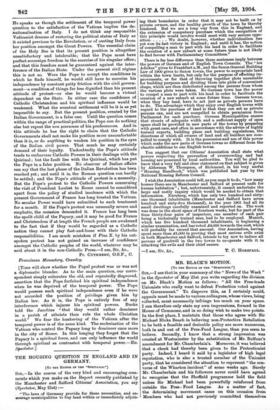THE HOUSING QUESTION IN ENGLAND AND IN GERMANY.
LTO THE EDITOR OP THE "SPECTATOR.")
Sin,—In the course of the very kind and encouraging com- ments which you make on the Report recently published by the Manchester and Salford Citizens' Association, you say (Spectator, May 21st) :— "The laws of Germany provide for these necessities, and en- courage municipalities to buy laud within or immediately adjoin-
ing their boundaries in order that it may not be built on by private owners, and the healthy growth of the town be thereby hindered. But we are a long way from this in England, and the extension of compulsory purchase which the recognition of this principle would involve would meet with very serious oppo- sition We doubt, however, whether individualism has yet won its last victory in England ; and until it has, the notion of compelling a man to part with his land in order to facilitate the creation of a new suburb at some future time is not likely to find favour with Parliamentary Committees."
There is far less difference than these sentences imply between the powers of German and of English Town Councils. The "lox Adickes" gives to Frankfurt a.M., and the Saxon General Building Law of 1900 gives to Saxon towns, the power to expropriate land within the town limits, but only for the purpose of effecting im- provements, or for that of throwing together plots unsuitable for building purposes and dividing them into plots of convenient shape, which are then distributed among the persons from whom the various plots were taken. No German town has the power to compel a man to part with his land in order to facilitate the creation of a new suburb at some future time. German towns, when they buy land, have to act just as private persons have to do. The advantage which they enjoy over English towns with regard to the purchase of land is that they cam act as private persons can, and are not compelled to obtain permission from Parliament for each purchase. German Municipalities ensure that streets of adequate width and a sufficient supply of open space shall be provided in new parts of the towns by preparing with great care, and often in accordance with the advice of highly trained experts, building plans and building regulations, the directions of which all owners of land and all builders are com- pelled to comply with. It is the possession and use of this power which make the new parts of German towns so different from the chaotic additions to our English towns.
You suggest that our Citizens' Association shall state what powers respecting the prevention of overcrowding and bad housing are possessed by local authorities. You will be glad to know that a very full and clear statement on that subject is given by Alderman W. Thompson, of Richmond, in his very useful "Housing Handbook," which was published last year by the National Housing Reform Council.
I wish the Association could tell, as you urge it to do, "how many houses there are in Manchester and Salford at present unfit for human habitation" ; but, unfortunately, it cannot undertake the large and costly inquiry which would be needed to obtain that information. Nurnberg, which has only two hundred and sixty- one thousand inhabitants (Manchester and Salford have seven hundred and sixty-five thousand), in the year 1901 had all its small dwellings carefully examined and reported on. The work was done in the short space of fourteen weeks, but for part of the time thirty-four pairs of inspectors, one member of each pair being a technically trained man, had to be employed. Munich, which has five hundred thousand inhabitants, is beginning a similar examination, and has voted £4,000 towards the cost, which will probably far exceed that amount. Our Association, having spent more than £1,000 in proving that most serious evils exist in both Manchester and Salford, intends to try now to induce all persons of goodwill in the two towns to co-operate with it in attacking the evils and their chief causes.
—I am, Sir, &c., T. C. HORSFALL.






































 Previous page
Previous page